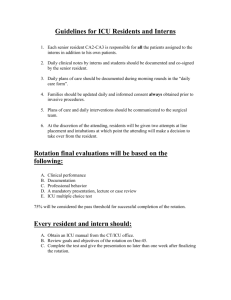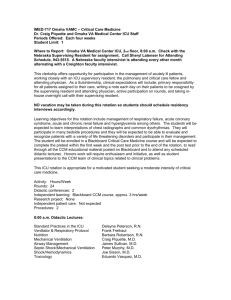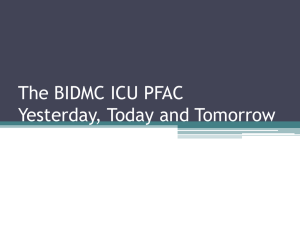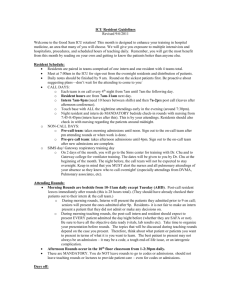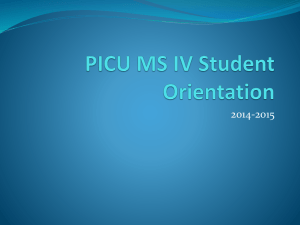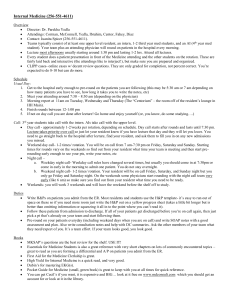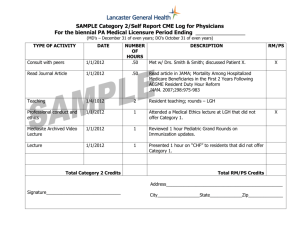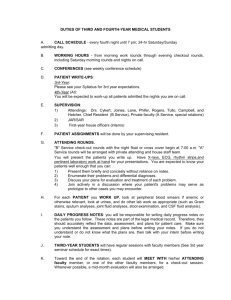ICU / CCU - Berkshire Health Systems
advertisement
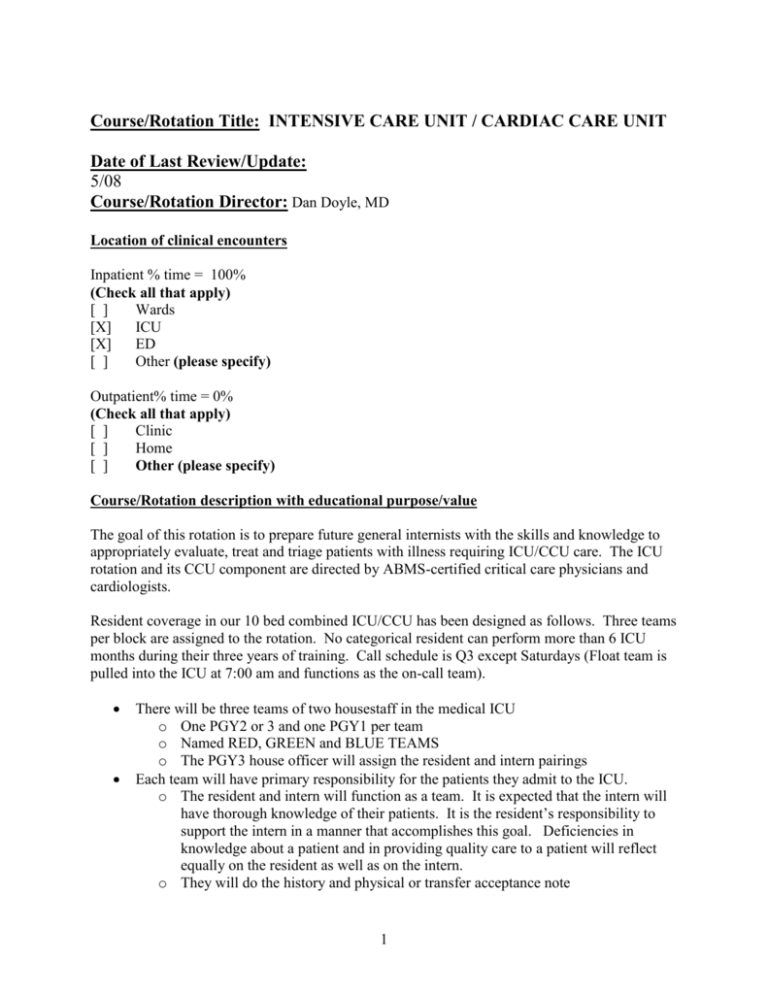
Course/Rotation Title: INTENSIVE CARE UNIT / CARDIAC CARE UNIT Date of Last Review/Update: 5/08 Course/Rotation Director: Dan Doyle, MD Location of clinical encounters Inpatient % time = 100% (Check all that apply) [ ] Wards [X] ICU [X] ED [ ] Other (please specify) Outpatient% time = 0% (Check all that apply) [ ] Clinic [ ] Home [ ] Other (please specify) Course/Rotation description with educational purpose/value The goal of this rotation is to prepare future general internists with the skills and knowledge to appropriately evaluate, treat and triage patients with illness requiring ICU/CCU care. The ICU rotation and its CCU component are directed by ABMS-certified critical care physicians and cardiologists. Resident coverage in our 10 bed combined ICU/CCU has been designed as follows. Three teams per block are assigned to the rotation. No categorical resident can perform more than 6 ICU months during their three years of training. Call schedule is Q3 except Saturdays (Float team is pulled into the ICU at 7:00 am and functions as the on-call team). There will be three teams of two housestaff in the medical ICU o One PGY2 or 3 and one PGY1 per team o Named RED, GREEN and BLUE TEAMS o The PGY3 house officer will assign the resident and intern pairings Each team will have primary responsibility for the patients they admit to the ICU. o The resident and intern will function as a team. It is expected that the intern will have thorough knowledge of their patients. It is the resident’s responsibility to support the intern in a manner that accomplishes this goal. Deficiencies in knowledge about a patient and in providing quality care to a patient will reflect equally on the resident as well as on the intern. o They will do the history and physical or transfer acceptance note 1 o The patient will initially be presented on rounds by the resident o The patients will be subsequently be presented daily by the intern o It is expected that the intern and the resident will have prerounded on their patients before work rounds with the intensivist. They will know what events have transpired since they signed out the patient They will have reviewed all pertinent available laboratory and imaging data and they will have reviewed consultations, progress notes and nursing notes They will have examined the patients The intern will therefore be prepared to present the patient, their findings and have some thoughts of a plan to address their patients’ problems The resident will complete the daily GOAL sheet The intern will keep the problem list updated When on duty, they (preferably the intern) will be responsible for writing all orders on their patients The intern will be responsible for writing the progress notes on their patients on a daily basis. Progress notes will not be completed by multiple house officers The team, if on duty, will write transfer orders and transfer notes for their patients. The “post call” team will present the new patients they admitted o If one team accrues a disproportionate number of patients the PGY3 resident will balance the assignments amongst the other two teams. The intensivist will be informed of this adjustment in patient assignments during daily rounds. o The patient will then be the primary responsibility of the new team. o The “post call” team will complete rounds, progress notes and sign out by noon o They will sign out their patients to the “on call” team Sign out will include but not be restricted to an updated problem list, a list of clinical issues and lab studies to check and other relevant clinical information The “on call” team will do all admissions, get sign out from the other two teams and cover patients in the absence of the other two teams. o The intern will admit patients to the ICU along with their resident o The intern will do the history and physical and the resident should be prepared to present the new patient the next day The “pre call” team will be available to do procedures in the ICU o They will remain in the ICU until 16:30 o They will sign out their patients to the “on call” team o If the “on call” team is occupied with an admission, they may support the “on call” team with the care of ICU patients during the day The pre call and post call teams will get sign out each morning from the on call team before starting their prerounds. MC/EF Team 2 o Assigned to the ICU as On-Call team every Saturday, Post call team every Sunday. o The rotation schedule has been designed such that all residents have at least one day off in 7 (average days off during month >5), no resident can average >80 hours per week, 10 hours off are guaranteed between shifts, and no resident has primary responsibility for patients for more than 24 hours or can work for more than 30 hours. B. Documentation The formal admission history and physical examination is the responsibility of the intern or medical student assigned to the patient. All intern and student history and physicals must be reviewed by the senior resident, cosigned and accompanied by a senior level admit note. All medical student progress notes must be reviewed and signed by the senior supervising resident (or intern if resident is unavailable). Documentation is a permanent part of the medical record. If a mistake in documentation occurs, a single line through the error with the editors initials noted is the only appropriate form of correction. All documentation should be signed legibly, dated and timed in accordance with Berkshire Medical Center medical records policies. All covered patients must have a daily house officer/student progress note. Please see appendix for appropriate content and form of history is, physicals, progress notes, accept notes. C. Communication All admission to the Berkshire Medical Center covered service must involve communication between the admitting attending physician and the house officer reviewing at a minimum the pertinent aspects of the case, differential diagnosis, and further evaluation and management steps. All covered patients must be reviewed daily with the attending physician of record or their coverage. Any change in status of a covered patient must be reviewed as soon as possible with attending of record or their coverage. D. Transfers Residents are responsible for following the resident transfer procedure E. Order Writing Residents are responsible for following resident order writing procedures F. Team Census See BMC Team Census Regulations (ICU) Types of Clinical Encounters: (PLEASE SPECIFY) Initial evaluation and triage of patients with serious illness both on floor and in ED Admission and follow up of all patients in the ICU 3 Mayday team MET team Sepsis Team See below under patient care & procedures Types of Patients: (PLEASE SPECIFY) [X] [X] [X] Adults of all ages Male Female Mix of Diseases: Included but not limited to (adapted form FCIM curriculum): Acid Base abnormalities Acute decomposition of valvular disease Acute MI Acute Pancreatitis Acute Renal Failure Aortic dissection ARDS Decompensated heart failure DIC DKA Dysrhythmias Electrolyte imbalance GI bleeding Hypertensive crises Liver failure Meningitis Multi-organ Dysfunction Syndrome Pneumonia Pulmonary Embolism Respiratory Failure Sepsis Shock: Hypovolemic, Cardiogenic, Distributive Stroke: hemorrhagic, ischemic Toxidromes Types of Procedures: (PLEASE SPECIFY): ACLS Abdominal paracentesis Arterial puncture Arterial line Arthrocentesis Central venous line placement 4 Lumbar puncture Nasogastric intubation Thoracentesis Endotracheal intubation Electrical cardioversion Swan Ganz Catheter Insertion Interpret ECG Interpret Chest and Abdominal plain imaging Interpret peripheral blood smears Interpret urinalysis Describe the level of supervision by faculty: [X] [X] [X] [ ] Attending staff will supervise and precept all patient care activity directly or indirectly. Attending staff will provide mid rotation feedback Attending staff will provide end-of-rotation feedback Other (please specify) Teaching Rounds: The ICU is an open unit and the majority of patients in the unit are usually under the care of their primary care physicians. Thus, the assigned Critical Care Pulmonologist responsible for daily (teaching rounds in the ICU occur 7 days per week) teaching rounds is able to focus the sessions on education rather than purely on management. Format follows the RRCIM PR V.E.1. “Teaching, or attending, rounds must be patient-based sessions in which current cases are presented as a basis for discussion of such points as interpretation of clinical data, pathophysiology, differential diagnosis, specific management of the patient, the appropriate use of technology, the incorporation of evidence and patient values in clinical decision-making, and disease prevention." "Teaching rounds must include direct resident and attending interaction with the patient, and must include bedside teaching and the demonstration of interview and physical examination techniques.” In addition, formal cardiology teaching rounds occur weekly. Competency Based Objectives/Expectations. Please see see Competencies and Graded Expectations with additional items specific to this rotation as below: Patient Care (PC) General (applicable to all PG years) o Evaluation and management of the patient suffering from acute myocardial ischemia (also MK). o Causes of acute respiratory failure and the indications for initiating ventilatory support as well as the management of the ventilator-supported patient (also MK). o Principles of diagnosis and management of the patient suffering from acute fluid and electrolyte disorders including acute renal and hepatic failure (also MK). o Causes and principles of management of the patient in shock (also MK). o Etiologies and evaluation of the patient suffering from an acute alteration in mental status (also MK). 5 o Indications for the use of the Swan-Ganz catheter, the interpretation of the information provided by the catheter, and the complications associated with its use (also MK). o Pertinent history and physical examination of the patient suffering from acute myocardial ischemia. o Initiation and subsequent management of ventilator support. o Management of shock patients, including establishing venous access and the management of vasoactive medications including placement and management of Swan-Ganz catheterizations. o Evaluation and management of the patient suffering from an acute alteration in mental status from a neurologic, metabolic, or toxic etiology. o Admissions: Initial patient evaluation. o Work rounds: Subsequent patient management o Radiology rounds: Evaluation of critical care radiology data o Attending rounds: Case discussion and didactic sessions o Discussion sessions: Urgent problem-solving PG1 o Clear, complete and well-structured H&Ps. Past medical history will go beyond simple lists, and include all important clinical detail.. Be especially detailed and accurate with the HPI. o All admission medications will be “explained/accounted for” in the medical history / past medical history Complete the Medication Reconciliation Form completely and accurately. o Presented cases will include a review of old records (where appropriate), which will be incorporated into a chronologically correct history. When rounding, always be able to report the patient’s home meds, and the current problem list. Focus on a problem oriented assessment and plan (A&P). Do NOT wait for the attending to create the differential diagnoses and plan. PG2 are responsible for above. In addition: o Be sure the students and interns are “on track” with their responsibilities and expectations. o Be ready to jump in during intern presentations to assist. If the intern fails to present data, misinterprets data, or can not present a coherent A&P it is fully expected you will help them to improve (chief residents and program directors are available for teaching advice). o Delegate appropriately, but be aware of all the teams’ patients’ problem lists, work-up status and expected disposition. o Look at the “big picture”; prioritize appropriately depending upon clinical circumstances and hospital logistics. o Goal sheets will be completed by senior resident. Goal sheets should be started before rounds and completed after each patient is seen. Goal sheets should be reviewed with the ICU charge nurse and placed on the nurses’ flow sheets. Goal sheets should be reviewed before sign-out at the end of the day o Update Common Problem List sheet daily 6 PG3 are responsible for above. In addition: o Function as a junior attending. o Anticipate the actions of the attending, and act accordingly. Don’t let the attending “beat you to the punch” on questions, teaching or patient care. o Goal sheets will be completed by senior resident. Goal sheets should be started before rounds and completed after each patient is seen. Goal sheets should be reviewed with the ICU charge nurse and placed on the nurses’ flow sheets. Goal sheets should be reviewed before sign-out at the end of the day Medical Knowledge PG1 o Be able to give indications/contraindications, dosage guidelines and potential adverse reactions to any medication a person is taking upon admission. Critically evaluate the appropriate continuation/discontinuation of each home medication in light of the current clinical condition. Be alert to possibility that a medication is causing / contributing to the patient’s problem. o Be prepared to present a differential diagnosis for the patient’s chief complaint, as well as any abnormalities found on physical exam, lab testing or imaging. o Be able to give important negatives and positives in history & physical exam, based upon knowledge of the pathophysiology and natural history of a given disease state encountered. PG2 are responsible for above. In addition: o Demonstrate expanded knowledge of disease states and pathophysiology. o Demonstrate increasing understanding of the interrelationship between different disease states and therapeutic interventions. o Expand awareness of predictable adverse reactions/complications of treatment. PG3 o Be a voice of authority on rounds. Demonstrate senior-level knowledge of common disease states and a ready comfort level in their management. Demonstrate knowledge of less common and more complex conditions and management plans. Be able to cite Evidence Based literature on clinical situations encountered on rounds. Practice-Based Learning Seeks out resources independently to gain increased knowledge and understanding of disease states with which the trainee is unfamiliar. Demonstrates facility with hospital based online databases (OVID, Cochrane, PubMed). 7 PG2 & 3 should demonstrate teaching and assessment of areas of weakness needing assistance for the PG1 members of the team Interpersonal and Communication Skills Develops a therapeutic relationship with patients & their families such that they look to the resident as their primary physician contact. Professionalism Develops a true sense of ownership and responsibility for all care their patients receive. Shows respect to and is able to learn from Respiratory Therapy, ICU Nursing and other ancillary ICU staff. System-Based Practice: Ability to work as part of a multidisciplinary team in caring for patients with critical illness. Understanding the principles of withholding/withdrawing life support and advanced directives. Check Any Methods Used For Teaching and Assessment: [ ] Ambulatory Clinic (feedback written & verbal) [ ] Annual In-service Exam (feedback written) [X] Attending Rounds (feedback written & verbal) [ ] Board Review (feedback written examination) [ ] Cancer Conference [X] Case Management Evaluation (360 degree written evaluation) [X] Chart Stimulated Recall & Feedback (feedback verbal) [X] Direct Observation and Feedback (feedback written & verbal) [ ] GME Core Curriculum [ ] Interns Report (feedback written & verbal) [ ] Journal Club (feedback written & verbal) [X] Medical Record Review (feedback written & verbal) [X] Mentor Feedback (feedback written & verbal) [ ] Monthly End of Elective Exam (feedback written) [X] Monthly Mini CEX (feedback written & verbal) [X] Monthly Competency Based Written Evaluation [X] Morning Report (feedback written & verbal) [ ] Multidisciplinary Rounds Feedback (feedback verbal) [X] Nursing Evaluation (360 degree written evaluation) [X] Patient Evaluation (360 degree written evaluation) 8 [X] Patient Management Discussions (feedback written & verbal) [ ] Procedure Logs [ ] Performance improvement Multidisciplinary Morbidity and Mortality (feedback written & verbal) [ ] Semi Annual Program Director Feedback (feedback written & verbal) [ ] Student Evaluation (feedback written & verbal) [X] Supervised Sign-In Rounds (feedback written & verbal) [ ] Supervised Sign-Out Rounds (feedback verbal) [ ] Other _______________________________ Other Policies: The Course Director recognizes that the trainee is accountable to all BMC Residency and GME Personnel Policies and Procedures. The Course Director recognizes that the residents are expected to attend all continuity clinics and mandatory educational conferences unless excused by the Program Director or Chief Medical Resident with advanced notice. Check The Educational Materials Used (beyond direct patient care): [X] Reading List (Please Specify): 1. 2. 3. 4. 5. 6. Critical Care Medicine - the Essentials. The Washington Manual. Marriot, Practical ECG. Mechanical Ventilation, Chest, 104(6):1833-59. The Textbook of Cardiac Life Support. Diagnostic Strategies in Disorders of Fluid, Electrolyte and Acid-base Hemostasis, AJM 72:490-519. 7. The Acute Respiratory Distress Syndrome, NEJM 332:27-37. 8. Hurst, The Heart. 9. Shoemaker, Textbook of Critical Care. 10. CD ROM titles - ICU Resource room [X] Review of Appropriate Radiology Images: Unless otherwise specified it is expected that the ICU team personally reviews all films ordered on their patients [X] Review of Appropriate Pathology: Unless otherwise specified it is expected that a member of the ICU team will personally review all pathology specimens with the attending Pathologist on patients for who the team is caring [X] Review of Appropriate Laboratory Data [X] Articles from the Literature: 9 It is expected that the ICU senior will pull, review, and disseminate information from relevant articles useful in the care of patients being cared for. [ ] Case Studies [ ] Other (Please Specify): 10
